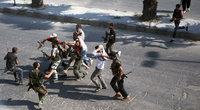Arnon Grunberg's Blog, page 462
November 11, 2012
Suitcase

Candlelight
On Wednesday October 31st I left New York. I packed my suitcase in candlelight.
Today I flew back to New York. There is power in my apartment. I put the candles in the closet and I asked myself: should I buy a flashlight to be prepared for the next storm?

November 10, 2012
Party

Pillow
On Friday night my godson came to my hotel for a pajama party. First he took a bath, then he watched television, he also managed to organize a pillow fight, afterwards he read a book and finally around 11 p.m. he fell asleep.
Around 7:30 a.m. he woke up. “It’s time for television,” he declared.

November 9, 2012
Proxy

Good shot
Anne Barnard in Friday’s Herald Tribune about Syria:
‘Syria’s rebel fighters — who have long staked claim to the moral high ground for battling dictatorship — are losing crucial support from a public increasingly disgusted by the actions of some rebels, including poorly planned missions, senseless destruction, criminal behavior and the coldblooded killing of prisoners.
The shift in mood presents more than just a public relations problem for the loosely knit militants of the Free Syrian Army, who rely on their supporters to survive the government’s superior firepower. A dampening of that support undermines the rebels’ ability to fight and win what has become a devastating war of attrition, perpetuating the violence that has left nearly 40,000 dead, hundreds of thousands in refugee camps and more than a million forced from their homes.
The rebel shortcomings have been compounded by changes in the opposition, from a force of civilians and defected soldiers who took up arms after the government used lethal force on peaceful protesters to one that is increasingly seeded with extremist jihadis. That radicalization has divided the fighters’ supporters and made Western nations more reluctant to give rebels the arms that might help break the intensifying deadlock. Instead, foreign leaders are struggling to find indirect ways to help oust Syria’s president, Bashar al-Assad.
And now arrogance and missteps are draining enthusiasm from some of the fighters’ core supporters.
“They were supposed to be the people on whom we depend to build a civil society,” lamented a civilian activist in Saraqib, a northern town where rebels were videotaped executing a group of unarmed Syrian soldiers, an act the United Nations has declared a likely war crime.
An activist in Aleppo, Ahmed, who like some of the others who were interviewed gave only one name for security reasons, said he had begged rebels not to camp in a neighborhood telecommunications office. But they did, and government attacks knocked out phone service.
One fighter shot into the air when customers at a bakery did not let him cut into a long line for bread, Ahmed recalled. Another, he said, was enraged when a man washing his car accidentally splashed him. “He shot at him,” Ahmed said. “But thank God he wasn’t a good shot, so the guy wasn’t hurt.”’
(Read the complete article here.)
A year ago I believed that the West should do much more to support the Syrian rebels, now I’m not convinced that this is the way to go, and not only because of this article.
Indeed, there is a case to be made that the West should stay out of Syria. The problem is of course that foreign powers (Iran, the US, Qatar, Turkey and Saudi Arabia) are heavily supporting one of the two sides. As Hussein Agha and Robert Malley wrote in the NY Review of Books Syria is already the arena “for a regional proxy war”.

November 8, 2012
Experience

Misleader
My friend Eric Schliesser alerted me to his blog about Spinoza:
‘Okay, now it is time to turn to Spinoza. Spinoza shares with a lot of Early Moderns a suspicion of speech. He is, for example, very clear that speech and written word can only present confused or inadequate knowledge. (E2P40S2 and the Latin). But in itself this does not mean Spinoza (or his fellow Early Moderns) depart from the traditional regime of truth. One might think that "true ideas" stand in for "true speech."’
(Read the complete entry here.)
Let me focus on what Schliesser says about speech and written word.
Spinoza writes in The Ethics:
‘From all that has been said above it is clear, that we, in many cases, perceive and form our general notions:--(1.) From particular things represented to our intellect fragmentarily, confusedly, and without order through our senses (II. xxix. Coroll.); I have settled to call such perceptions by the name of knowledge from the mere suggestions of experience.’
(E2,PropXLS2)
And: ‘Knowledge of the first kind is the only source of falsity, knowledge of the second and third kinds is necessarily true.’
(E2,PropXLI)
In other words, knowledge from the mere suggestions of experience is the only source of falsity.
The mere suggestions of experience, things represented to our intellect through our senses are more than just speech and written word.
Falsity presupposes misleadingness, at least that’s what I assume for the moment.
We believe that there is a misleader somewhere out there, probably even a Big Misleader.
But if we ought to distrust our senses it’s very well possible that the Big Misleader is inside us.
We are our own con man.
This is a Freudian reading of Spinoza.

November 7, 2012
Malheur

Utensils
Wednesday morning I gave a lecture about Spinoza at Tilburg University .
Hotel Auberge du Bonheur was recommended to me.
I checked in on Tuesday evening. The room was cold and slightly unpleasant.
When I walked into the breakfast room this morning a waitress asked me: “How can I help you?”
“I’d like to have some breakfast,” I answered.
“Oh,” she said. “Well, sit down.”
I sat down.
“Not here,” she said. “Go to a table with utensils. There are no utensils on this table as you can see.”
I was the only guest and I left within five minutes.
Shortly after this encounter I checked out.
The lady at the front desk said: “That 114 euros. Oh no, you belong to the university, that’s 131 euros and 50 cent.”
I wanted to say: “I don’t belong to the university,” but I kept silent.
Auberge du Malheur would have been a better name for this hotel, but not everybody is blessed with a sense of irony.
And I have to admit that I had a good time at Auberge du Malheur, I just missed Manuel a bit.

November 6, 2012
Exhibition

Mass market
“I’m going to see the Andreas Gursky exhibition tomorrow,” I told a friend on Monday afternoon.
He nodded.
“Did you see it?” I asked.
“I went to the opening, but then you don’t see much. Gursky is good at superficiality.”
Yes, Gursky is good at it, he is good at showing mankind as just another element of the mass market.
Individuality is an illusion.
(You can find more information about the Gursky exhibition in Dusseldorf here.)

November 5, 2012
Flemish

Bond
On Sunday a Flemish journalist and a friend of mine asked me: “So you have a name for your strong bond with your mother, you call it Europe?”
I hesitated for a second and then I answered: “Yes, that’s how I would call it.”

November 4, 2012
In time

Reliable
According to Yousaf Butt in Saturday’s Herald Tribune we should prepare for a solar storm:
‘Horrendous and damaging as it was, Hurricane Sandy would be considered only an opening act compared with a powerful “once-in-a-century” solar storm.
These storms of charged particles and magnetic fields are unleashed periodically by the Sun and — if headed toward Earth — can cause havoc with satellites and the electricity grid.
Unlike with Sandy, we are woefully underprepared both to detect such impending storms and to respond to them. Although they can come at any time, their likelihood waxes and wanes in 11-year cycles — with the next period of maximum activity being next year.
A powerful solar (or “geomagnetic”) storm has the potential to simultaneously damage multiple transformers in the electricity grid and perhaps even bring down large sections of it, affecting upwards of a hundred million people in the United States for many months, if not years.
These huge transformers are expensive and difficult to replace, and not many are stockpiled in the United States for an emergency. In the worst case, the impact would be devastating: An outage could cost a few trillion dollars, with full recovery taking years. Not only would parts of the grid be compromised, but telephone networks, undersea cables, satellites and railroads also would be affected.
A 2008 National Academy of Sciences study warned that “because of the interconnectedness of critical infrastructures in modern society,” the “collateral effects of a longer-term outage” would likely include “disruption of the transportation, communication, banking and finance systems, and government services; the breakdown of the distribution of potable water owing to pump failure; and the loss of perishable foods and medications because of lack of refrigeration.”
Similarly, a recent Lloyd’s of London report cautioned that “a loss of power could lead to a cascade of operational failures that could leave society and the global economy severely disabled.”’
(Read the complete article here.)
Full recovery taking years – perhaps it’s wise to rent an apartment with reliable internet connection in New Zealand.
But then the big question is: how do you get in time to New Zealand?

November 3, 2012
Landline

Answering machine
According to Con Edison’s website there is still no power in my apartment.
I felt ashamed for having left New York.
But this afternoon I called my landline in New York and my answering machine answered.
The feeling of being ashamed faded away.

November 2, 2012
Baby

Wine
Last night, my ex invited me for dinner. It was my first dinner invitation to her apartment after she moved in with her new boyfriend. Two friends of ours were invited as well.
The boyfriend, whom I didn’t know very much, turned out to be a delightful man and a great connoisseur of wine. After the main course the ex said: “I will be pregnant within a year.”
The boyfriend looked at me and said: “I didn’t know about this.”
It was a very happy evening, but I was a bit jet-lagged. Around 1 a.m. I asked my ex: “Could you call a taxi for me?”
Before I left the boyfriend told me: “We should organize a salon together.”

Arnon Grunberg's Blog
- Arnon Grunberg's profile
- 416 followers



